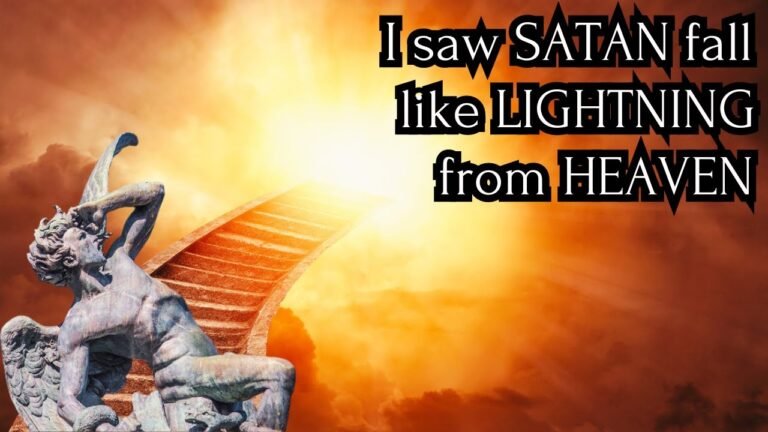The Timing of Lucifer’s Fall from Heaven
The story of Lucifer’s fall from grace is one of the most captivating narratives in religious texts, sparking intrigue and debate for centuries. Many wonder when was Lucifer cast out of heaven, a pivotal moment that symbolizes the eternal struggle between good and evil. This event not only reshaped the celestial hierarchy but also laid the groundwork for a myriad of interpretations across various cultures and belief systems. Exploring the origins and implications of this dramatic expulsion invites readers to delve deeper into the complexities of morality, rebellion, and redemption.
In which part of the Bible is it mentioned that Lucifer was cast out of heaven?
The concept of Lucifer’s fall from grace is vividly illustrated in Isaiah 14:4–17, where the text describes the “son of the morning” who has been “cast down to the earth.” This powerful imagery conveys a dramatic shift from exaltation to humiliation, symbolizing the consequences of pride and rebellion against divine authority. The passage has inspired interpretations that attribute the name “Lucifer” to this fallen figure, emphasizing the transformation from light to darkness.
This association is further reinforced by the Latin translation of the Hebrew term for “morning star,” which is rendered as “lucifer.” This term has since become synonymous with the notion of a once-glorious being who fell from heaven. The narrative serves as a profound reminder of the themes of hubris and redemption woven throughout biblical literature, inviting readers to reflect on the nature of ambition and the potential for downfall that accompanies it.
Who cast Lucifer out of heaven?
In the celestial hierarchy of biblical lore, Archangel Michael stands out as a formidable warrior against the forces of darkness. His most notable triumph is documented in Revelation 12:7-12, where he engages in a fierce battle with Satan. This epic confrontation highlights Michael’s role as a protector of heaven and a defender of divine order, showcasing the eternal struggle between good and evil.
As the battle rages, Michael’s victory is not just a personal achievement but a significant turning point in the cosmic narrative. By casting Lucifer out of heaven, he ensures that this once-revered angel can no longer act as the accuser before God. This pivotal moment underscores Michael’s unwavering commitment to safeguarding the sanctity of the heavenly realm against rebellion and chaos.
The story of Michael’s triumph serves as a powerful reminder of the ongoing battle between light and darkness. It emphasizes the importance of vigilance and resilience in the face of temptation and evil. Michael’s legacy continues to inspire believers, symbolizing hope and the promise of divine protection in the spiritual journey.
What was Lucifer’s name as an angel?
Samael, once a revered archangel, became known as Lucifer after his fall from grace. His rebellion against the divine hierarchy led to his banishment from Heaven, where he was destined to rule over Hell. This transformation marked not just a change in name, but a profound shift in identity, fueled by a simmering resentment towards his father, who cast him out, and his mother, who remained silent during his trials.
In his new realm, Lucifer embodies the complexity of a fallen angel, grappling with feelings of betrayal and isolation. His story is one of defiance and transformation, as he navigates the intricate dynamics of power and revenge. The narrative of Samael’s descent into Lucifer serves as a poignant reminder of the struggles between light and darkness, loyalty and rebellion, echoing through the ages as a cautionary tale of ambition gone awry.
Unraveling the Celestial Clock: When Lucifer’s Descent Began
In the intricate tapestry of celestial mythology, the descent of Lucifer marks a pivotal moment that resonates through the ages. Traditionally depicted as the Morning Star, his fall from grace symbolizes the clash between ambition and divine order. This profound shift serves as a reminder of the delicate balance between light and darkness, urging us to reflect on the nature of free will and the consequences of our choices. As we delve deeper into this narrative, we uncover the layers of meaning that have shaped cultural understandings of rebellion and redemption throughout history.
Lucifer’s descent is not merely a tale of downfall; it is a compelling exploration of transformation and the quest for identity. This myth invites us to consider the duality within ourselves, embodying both the spark of creativity and the shadow of hubris. By unraveling the celestial clock that marks his journey, we gain insight into the human experience, where every rise carries the potential for a fall, and every fall holds the promise of rebirth. Ultimately, the story of Lucifer serves as a powerful metaphor for our own struggles against the forces that seek to define us, encouraging us to embrace our complexities and pursue our true paths.
The Cosmic Countdown: Key Moments in Lucifer’s Downfall
The descent of Lucifer, once the most radiant of angels, unfolds like a cosmic drama marked by pivotal moments that reshape the celestial order. His initial act of defiance, fueled by pride and ambition, ignited a rebellion against divine authority. This rebellion was not merely a personal vendetta; it represented a profound challenge to the hierarchy of Heaven, setting the stage for an epic clash between light and darkness.
As the celestial conflict escalated, key allies and adversaries emerged, each playing a critical role in Lucifer’s fate. The archangels, led by Michael, rallied to defend Heaven, demonstrating unwavering loyalty to the divine will. Their fierce commitment highlighted the stark contrast between loyalty and betrayal, emphasizing the high stakes of the battle. With each confrontation, Lucifer’s arrogance blinded him to the consequences of his choices, pushing him further down his path of isolation and despair.
The final act of Lucifer’s downfall came with his banishment from Heaven, a moment that reverberated throughout the cosmos. Stripped of his former glory, he became a symbol of lost potential and the tragic cost of rebellion. This expulsion served not only as a defining moment for Lucifer but also as a cautionary tale for all beings, reminding them of the delicate balance between ambition and humility in the grand tapestry of existence.
From Light to Darkness: The Chronology of Lucifer’s Fall
The story of Lucifer’s fall is one that weaves a profound narrative of ambition, pride, and ultimate downfall. Once a radiant being, Lucifer embodied light and beauty, standing as the highest of the angels in the heavenly hierarchy. His desire for supremacy and his quest for power led him to challenge the very authority of the Creator, igniting a celestial rebellion that would change the course of existence. As his ambition spiraled into defiance, the once-glorious angel found himself cast from the heavens, descending into the depths of darkness.
This dramatic shift from light to shadow marks the beginning of a new chapter for Lucifer, transformed into a figure synonymous with temptation and despair. Stripped of his divine glory, he became the architect of chaos, seeking to sway humanity towards the same path of rebellion that led to his own downfall. The echoes of his fall resonate through time, serving as a cautionary tale about the perils of overreaching ambition and the consequences of turning away from the light. In this stark contrast between his former brilliance and present obscurity, Lucifer embodies the eternal struggle between good and evil, illuminating the choices that define our existence.
The story of Lucifer’s fall from grace, often linked to various interpretations of biblical texts, invites us to reflect on the nature of pride and rebellion. Rooted in ancient narratives, this pivotal moment serves as a cautionary tale about the consequences of defiance against divine order. Understanding when Lucifer was cast out of heaven not only enriches our grasp of religious lore but also offers timeless lessons relevant to our own lives.







